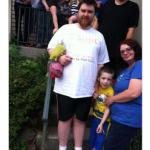I couldn’t help thinking about my nephew, Jake-o-rama, when I read the article in the Philadelphia Inquirer. The headline on my Google News item read: Medical debate: Should autism block a man from getting a heart transplant?
The man, Paul Corby, is twenty-three. In the picture, he stands in front of a phalanx of family members, clutching a stuffed toy. He’s a large man, just like Jake. He smiles into the camera attentively, an expectant look on his face. Except for the incongruity of a grown man with a toy, he seems like a normal guy.
In addition to autism, Paul has Pervasive Developmental Disorder Not Otherwise Specified, like Jake. Unlike Jake, Paul suffers from depression as well as an unspecified mood disorder.
Jake graduated two years ago from the prestigious Girard Academic Music Program (GAMP) one of Philadelphia’s magnet schools.
Getting him into GAMP wasn’t easy. Though all Philadelphia magnet schools must admit a percentage of students with disabilities, GAMP had yet to admit an autistic student, and the administration was somewhat reluctant. In the end, my brother had to use the services of a lawyer who specialized in advocating for children with disabilities.
Jake’s four years at GAMP weren’t without difficulties, but he persisted, with the help of his father, and a supportive vice-principal who valued Jake for his perfect pitch in choir and his sunny, helpful disposition. Now that he’s finished high school, he says he’d like to have a job, but, like getting into GAMP, getting a job isn’t easy: it takes discipline and determination, qualities in short supply among the developmentally disabled.
With Jake on my mind, I dashed off an email to my brother with a link to the article. I expected him to be incensed, but he was thoughtful, instead. Though he’s devoted to caring for his son, he says he understands why a transplant for someone like Paul could be problematic.
According to the Inquirer piece, Paul can yell. In fact, the police have been called to the house three or four times as a result of his shouting. Jake can yell too. And I can tell you that it’s scary when a large guy yells at you, and you know he doesn’t have much impulse control.
“They’ll have to use steroids after the operation,” said my brother. Steroids can have deleterious side effects, including a weakening of the immune system, and a host of behavioral issues, including extreme agitation, paranoia and psychosis. I shudder to consider what it would be like to be on the receiving end of a tantrum being thrown by an angry, confused 350-pound man.
For my brother, the issue of transplants is a thorny one. He thinks that perhaps scarce medical resources could be better utilized by focusing on helping more people instead of individuals. He wonders aloud if transplants, especially in the case of elderly or otherwise infirm people, might benefit the medical and pharmaceutical industries more than the 50.7 million without insurance and in need of medical assistance. Perhaps because Jake is healthy, it’s easy for my brother to say, but I think he has a point.
If you think that Paul should have the transplant, which he wants, here’s a link to an online petition, started by his mother.




